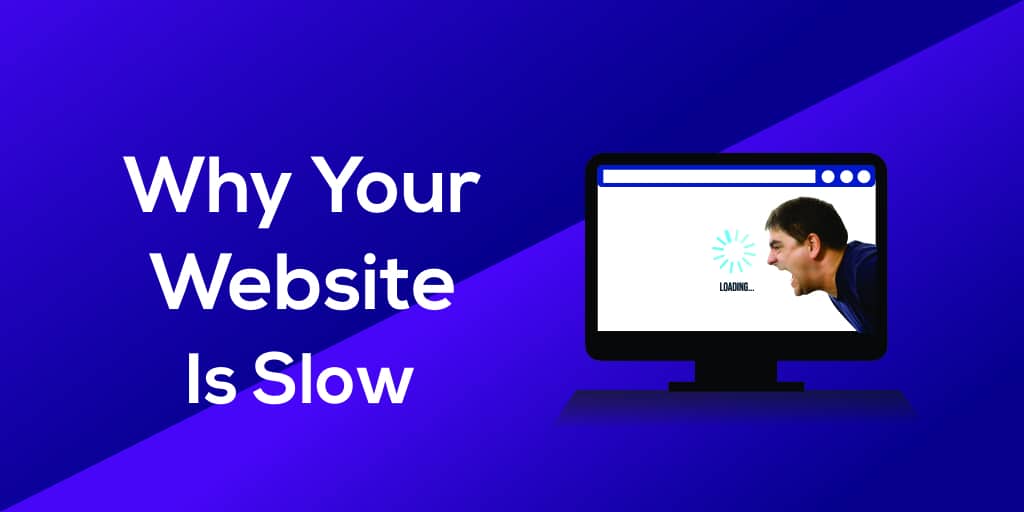It’s reasonable to assume that a website’s loading time is important.
We can confidently conclude that slow sites have usability and SEO issues because we know that users hate waiting for web pages to load and that Google uses site speed as a factor for its search rankings.
But, quantitatively, what are the other effects of having a slow website?
Why Website Speed Matters
Apart from the fact that your audience today is probably the most impatient generation of all time, you have to understand that nobody likes a website that’s slow. Nevertheless, here are a few important reasons why website speed matters:

- We’ve all heard the old adage ” the first impression is the last impression.” Well, that particular concept applies to websites as well. When a user visits your website for the first time, you can be sure that they will make a judgment about you, your website quality and your business. It is highly recommended that you don’t botch this up because if your website is too slow or too difficult to navigate, that user is NOT coming back. So, if you want to make a strong first impression, make sure your website loads fast.
- Today’s website user is always on the go. Even if they have everything on the tips of your fingers, they are still always busy, always moving and always impatient. When it comes to the Internet and websites, they expect speed. And if they don’t’ get it, they won’t bother with it. The only way you will ever find people willing to wait for a website to load is if its a high-authority site. Let’s be real. Technological problems can occur. Sometimes, even good-old-Google can have a bad day. The only problem is that you cannot risk irking your audience with a slow website unless you’re Google. And Google doesn’t do it every day. This is just an example that if a breakdown occurs once a year, your audience will only forgive you if you’re as big and as good as Google. Otherwise, you need to make sure you have all the parameters right, and website speed is one of the most important.
- The goal of digital marketing is to attract people to try out your products or services. This applies to every type of web page, even if it’s a simple blog. A blogger wants readers; an online book store wants book buyers; an online electronics store wants to sell TVs. And how can you do that? You can do that by offering a great user experience. If you want to sell books, make sure you have a great collection. If you want to sell TVs, make sure you have all high-quality brands and good prices. If you want to increase your readers, make sure you give them good content. But none of this will work if your website does not have a good loading speed. Never forget – website speed is important for good user experience.
- If your website speed is pathetic, your conversion rates are likely to be the same. On average, if your website takes longer than 3 seconds to load, approximately 40% of your visits will abandon your site. What does this mean? This means a slow website will drive customers away. This, in essence, destroys the entire purpose of having a website. Do a speed check and make sure you don’t lose 40% of your audience just because you didn’t focus on speed.
Speed Check Your Website
What we’ve discussed above clearly establishes the importance of speed. Thus, it is important to speed test your website before you launch it. You need to know how fast it loads on all major browsers; you also need to make sure it has a good loading speed on all platforms – whether its a desktop, mobile or tablet. Also, make sure you don’t just conduct a speed check locally. If your goal is to cater to a global audience, make sure you test the website speed for all major regions.
This is the age of the digital consumer. And for this digital consumer, quality and easy access matters. Flexibility and ease of use also matter. And so does speed. If your website is slow, this digital consumer will find another website that offers them the same thing but with much faster response time. Don’t lose your customers for something as simple as loading speed. Focus and get it right the first time.
Hosting Choice
You should first ask yourself: does your current hosting platform fulfill the requirements of your web project? Most website operators want to save money when choosing a host and tend to select the cheapest option available. But this comes at the expense of server performance and capacity. And there’s a downside to frugality: for instance, the platform could lack the necessary bandwidth to handle all user requests. With cheap hosting solutions, several parties share a server, which doesn’t allow much growth or increased visitor numbers to a particular website. Another typical mistake is to host your website on a server located abroad, which actually increases your website’s loading times.
What to do:
- Use flexible hosting solutions with unlimited web space and traffic
- Only hire servers that are located in the same country as most of the users
- Use a content delivery network if you plan to target an international audience
- Take care of the hosting yourself so you can adjust it to the needs of your project
Conclusion
These studies impart upon us one important lesson: Website speed should be a high priority if we want to build great websites. If you have a slow website, I’d suggest troubleshooting to figue out why it is slow.
